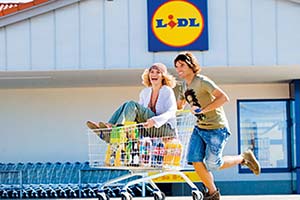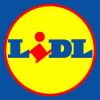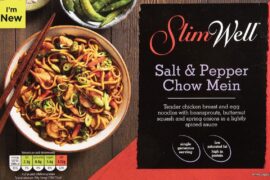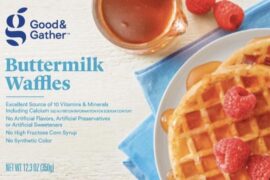The latest grocery market share figures from Kantar Worldpanel, covering a three-month period ending August 13, 2017, show Lidl has increased its market share to a new record high of 5.2% – up 0.7 percentage points year on year – in edging out Waitrose to become the United Kingdom’s seventh largest grocer.
 Fraser McKevitt, head of retailer and consumer insight at Kantar Worldpanel, commented: “Ten million households visited the retailer’s expanding network of stores during the past 12 weeks, as it increased sales by 18.9% overall. Lidl is growing sales 40% faster with families than with households without children. Families tend to buy more items each time they shop, so strong growth with this demographic has helped to increase its average basket size year on year. Not far behind, Aldi grew sales by 17.2%, attracting 1.1 million more shoppers through its doors than this time last year and increasing market share by 0.8 percentage points to stand at 7.0%.”
Fraser McKevitt, head of retailer and consumer insight at Kantar Worldpanel, commented: “Ten million households visited the retailer’s expanding network of stores during the past 12 weeks, as it increased sales by 18.9% overall. Lidl is growing sales 40% faster with families than with households without children. Families tend to buy more items each time they shop, so strong growth with this demographic has helped to increase its average basket size year on year. Not far behind, Aldi grew sales by 17.2%, attracting 1.1 million more shoppers through its doors than this time last year and increasing market share by 0.8 percentage points to stand at 7.0%.”
Ice Cream Dips, Burger Sales Sag
McKevitt continued: “Overall supermarket sales grew by 4.0% year on year, although disappointing weather hit summer favorites hard during the past month. Ice cream sales were down 9% as consumers huddled indoors. Burger purchases slumped by 25%, an £8 million loss year on year, as rain dampened the nation’s appetite for barbecues.
In contrast, sausages managed to escape the summer downturn thanks to a growing taste for posh bangers. One-third of those bought during the month were from premium own label lines, as retailers persuaded shoppers that sausages should be enjoyed beyond the barbecue.”
Like-for-like grocery inflation increased slightly to 3.3% after holding steady at 3.2% for the past two months. At the current rate, price increases could add a further £138 to the average household’s annual grocery bill, with the price of butter and fish most affected.
‘Big Four’ Sales Up, Shares Down
Meanwhile there is good news for the UK’s largest retailers, as the recovery which has so far defined 2017 continues apace.
McKevitt commented: “All four of Britain’s biggest grocers managed to grow sales for the fifth consecutive period, a run of collective success not seen since 2013. However, this welcome period of sustained growth hasn’t been enough to entirely offset pressure from the discounters. The big four now account for just 69.3% of the UK grocery market – down from 76.3% five years ago – and that looks set to fall further in the coming months.”
Overall revenues grew by 3.0% at Tesco, helped by an increase in volume sales, but market share fell to 27.8% – down 0.3 percentage points compared to last year.
Morrisons increased sales by 2.6% – the ninth consecutive period of growth for the Bradford-based supermarket – while market share dropped slightly to stand at 10.4%. The company’s online business is performing particularly well, as it continues to increase market share by expanding delivery service further afield in the UK.
Meanwhile, Sainsbury’s sales rose by 2.0% as the grocer’s market share fell to 15.8% – down 0.3 percentage points year on year.
After a difficult couple of years, Asda has managed to continue the run of positive sales performance, which began in April this year – up 1.4% during the latest quarter. This follows the retailer’s recent announcement of a return to like-for-like sales growth, suggesting it is experiencing recovery across the board. Own label has been important to the grocer’s turnaround, providing a boost from both ends of the price spectrum. Indeed, the value ‘Farm Stores’ and premium ‘Extra Special’ lines both saw double-digit growth during the past 12 weeks.”
Waitrose’s market share held steady at 5.1% as it managed to increase sales by 2.8% year on year, continuing the unbroken run of growth the grocer has enjoyed since March of 2009. Sales of branded goods were up 7% year on year at Waitrose – particularly noteworthy at a time when many retailers are focusing more on their own label lines.
After more than two years in growth, Co-op’s sales declined by 0.4% as its market share fell to 6.3% – down 0.3 percentage points compared to this time last year. This dip is at least partly attributable to the retailer’s sale of nearly 300 of its stores to convenience chain McColl’s.
Frozen food specialist Iceland’s share of the UK grocery market was flat at 2.1%. Meanwhile, a 12.6% sales increase realized by online specialist Ocado resulted in its market share edging up from 1.3% to 1.4% of the overall grocery market. The Symbols & Independent share dipped to 1.9% from 2.0%, and the Other Outlets segment slipped to 1.7% from 1.8%.





